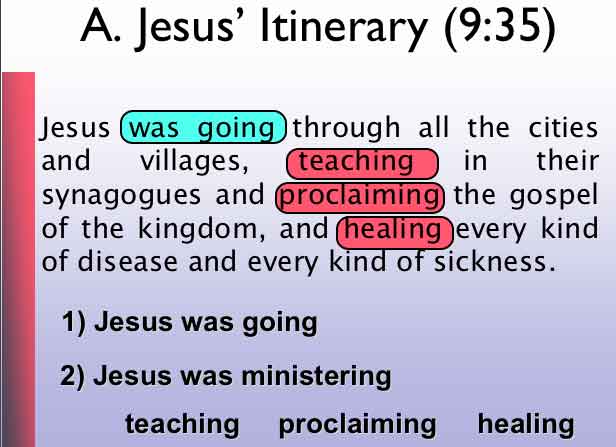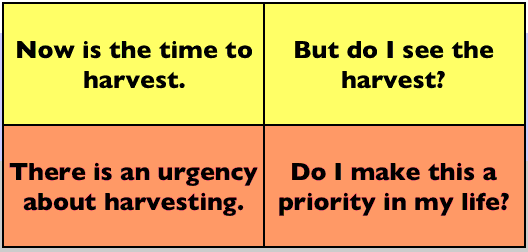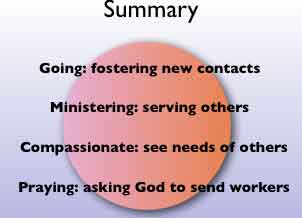Matthew 9:35-38
Going into His Harvest
What is one of your most difficult Bible verses? Mine comes from this text. It is not that I did not care about telling people about Jesus. I did care. I told lots of people of Jesus. But what I experienced was so different than what Jesus says. Jesus said, “The harvest is plentiful.”
 Now it doesn’t mean that I thought Jesus was wrong, but I just kept this conflict in my mind for a long time. Maybe your experience is different. Maybe lots of people are eagerly coming up to you and wanting to hear the Gospel. I would share the Gospel with many people but no one was very hungry.
Now it doesn’t mean that I thought Jesus was wrong, but I just kept this conflict in my mind for a long time. Maybe your experience is different. Maybe lots of people are eagerly coming up to you and wanting to hear the Gospel. I would share the Gospel with many people but no one was very hungry.
When I was young, our youth started a Coffeehouse that God turned into a Christian coffeehouse. Lots of people came which was good. Many of them heard the Gospel. But they probably came because of the music, the coffee or the cool hang out place of the Ship’s Lantern. But only a few came to know the Lord. Again, I am not saying that this is bad but that it all seemed to confirm my observation that people didn’t really need Jesus. There wasn’t much of a harvest.
Biblically speaking, I knew people did need Jesus. Jesus was the Light of the World. I personally was transformed. Jesus was and is so special. So because of this, I kept on evangelizing.
It was largely through this passage in Matthew 9:37 that kept me going at this issue. If it was up to me, I would have given up. Why bother? I feel awkward. It is always hard starting to talk to someone. And again, not many people really are interested. Jesus’ perspective, however, kept challenging my experience so I kept on sharing.
|
In the end I discovered I had a wrong perspective. I just couldn’t see things as Jesus did. I didn’t sufficiently understand how my Heavenly Father worked. Perhaps this is not a problem to you, but when I began to grasp this, it served as a sort of breakthrough. Now I am just beginning to understand this aspect of evangelism.
Let’s look at this passage together and see what Jesus does say. After all, Jesus did more in three short years than all of us together in our lifetime. Let us first look more carefully at this passage of Matthew 9:35-38.
Jesus was going through all the cities and villages, teaching in their synagogues and proclaiming the gospel of the kingdom, and healing every kind of disease and every kind of sickness. Seeing the people, He felt compassion for them, because they were distressed and dispirited like sheep without a shepherd. Then He said to His disciples, "The harvest is plentiful, but the workers are few. "Therefore beseech the Lord of the harvest to send out workers into His harvest." (NASB used unless otherwise noted).
A. Jesus’ Itinerary (Matthew 9:35)
B. Jesus’ Insights (Matthew 9:36-37)
C. Jesus’ Instruction (Matthew 9:38)
Conclusions
A. Jesus’ Itinerary (Matthew 9:35)
If all the things Jesus did and say would fill the largest library in the earth, imagine how compressed a sentence would be that summarized all that He did. This is what we find in Matthew 9:35. Let’s just read it once again.
Jesus was going through all the cities and villages, teaching in their synagogues and proclaiming the gospel of the kingdom, and healing every kind of disease and every kind of sickness.
1) Jesus was going
The first thing that stands out is the word ‘going.’ Do you know what it reminded me of? It particularly reminded me of Matthew 28:19-20, the Great Commission. The two verses are similarly structured.
“Go therefore and make disciples of all the nations, baptizing them in the name of the Father and the Son and the Holy Spirit, teaching them to observe all that I commanded you; and lo, I am with you always, even to the end of the age.” Matthew 28:19-20

Do you see the “go” word and the ministry that followed? Whatever we think of the Great Commission, we can honestly say that Jesus did what He instructed us to do.
The best translation of this phrase is that Jesus was going throughout the land and was continuing to do that. It is something He did but He still was doing. The NIV does not carry this meaning with the word ‘went.’ But it is this thrust forth into the world that is so characteristic of the Great Commission. “As you are going into the world, make disciples …” (Mat 28:18).
Behind all ministry is the thrust into new and perhaps uncomfortable places. For example, it would be much easier to sit down and play computer games or watch some movie than reach out to others in need. Some have been thrust forth into new situations by the ‘Happy English Corner’ where they help others learn English. They could have stayed home, but they discerned God wants them to go. And as they went out, they found opportunities to minister. By the way, the word ‘minister’ is here used to refer to acts of Christian love where Christ is made know through life and words. Others have made planned strategic ‘goings’ by going house to house visiting. They are open to God’s plan for them. Others still would take people grocery shopping or make a phone call to the new person. It is exciting to see how many ways the Lord leads His people.
The thrust of the Great Commission is not to go but to make disciples. They and we are presumed to go. As a Christian, we have the Spirit of Christ in us accompany us wherever we go. It is perilous to think of ourselves as stationary, still, and isolated. We do not always mean physical movement because some circumstances like Moms with little children can be quite restrained at times. But within ones context, one needs to be opening our hearts to others rather than closing them out.
Missions of course is based on this premise of ‘going.’ We have a responsibility to those around us. We must not stop with our own needs, your own culture’s needs, your own college’s needs, your own town’s needs, but like Jesus be open to go where God leads. OIF has intentionally ‘gone’ by opening our hearts to people from all the nations. We surely have lots to learn, but God is a good teacher. I love the addition to praying for the nations in our prayer meetings. Through these times, we can begin to sense how God wants us to go around Oakland or around the world. We have gone, but are still going and I do not imagine that this will stop.
2) Jesus was ministering
In Matthew 9:35, we read of Jesus Christ carrying out all sorts of ministries. The word ministry means ‘to serve’ from the Latin ministerium. The focus of Jesus’ work, in other words, was on the needs of others rather than on His own needs. We do not mean it is wrong to care for ones body. Not at all. But He captured His time and abilities to serve others as much as possible. He had an advantage like some of you in being single. We might not be called for life like this, but God does give us special opportunities where we can capture more time to serve the Lord more.
Singlehood is an opportunity to show your great appreciation to the Lord by being filled with His Spirit and serving others in their needs. When we focus on serving, then our bad habits of wasting time can easily be put aside. Get involved in the lives of others, and you will see the change in yourself.
 I for example love chess. But when I got to university, I dropped out of the leagues to learn more of Christ and spend my time serving. Even now, rare is the time I have to play a game of chess even though with a press of a button I could have a good challenge. It is true that God might have us ‘go’ by pressing on with some interest. I sensed that was the case when I was heavily involved in tournaments. As captain of the chess team, I had lots of respect from others where I could live and speak out the gospel with others. The key is never to prize what we are doing so that we are not willing to give it up for where else our Lord might send us. In that case, we would be staying rather than going. Nor are we to like what we are doing so much that we have no ministry. If there is no ministry, prayerfully participate another month and if nothing comes of it, then consider it gone. Move on.
I for example love chess. But when I got to university, I dropped out of the leagues to learn more of Christ and spend my time serving. Even now, rare is the time I have to play a game of chess even though with a press of a button I could have a good challenge. It is true that God might have us ‘go’ by pressing on with some interest. I sensed that was the case when I was heavily involved in tournaments. As captain of the chess team, I had lots of respect from others where I could live and speak out the gospel with others. The key is never to prize what we are doing so that we are not willing to give it up for where else our Lord might send us. In that case, we would be staying rather than going. Nor are we to like what we are doing so much that we have no ministry. If there is no ministry, prayerfully participate another month and if nothing comes of it, then consider it gone. Move on.
Let’s list the activities that Jesus was involved in.
- Teaching in their synagogues
- Proclaiming the gospel of the kingdom
- Healing every kind of disease and every kind of sickness.
‘Teaching’ seemed to be more in depth ministry of explaining God’s Word. He would do this in a protected locale like a building. In this case it was in synagogues, Jewish church buildings. People came together to learn more of God’s Word. We have many classes where we teach. We can see how Jesus Himself ‘made disciples.’ He valued instruction. Instruction gives us occasion to keep growing. We have discipleship classes, parenting classes and provide all sorts of instruction on how people can keep growing. Of course teaching occurs in our cell groups and families too. I was horrified to recently hear how only 3 out of 10 evangelical parents think about evangelizing their own children! If parents don’t value the gospel, then certainly their children won’t either.
 ‘Proclaiming the gospel of the kingdom’ is an interesting clause. First of all we need to see that He was telling everybody about God’s kingdom. He did not just teach, He proclaimed it. Teaching is important, but it is very selective. We have a special discipleship class just starting. People have to come to it though. If they are not here at 4 p.m., then they miss it.
‘Proclaiming the gospel of the kingdom’ is an interesting clause. First of all we need to see that He was telling everybody about God’s kingdom. He did not just teach, He proclaimed it. Teaching is important, but it is very selective. We have a special discipleship class just starting. People have to come to it though. If they are not here at 4 p.m., then they miss it.
But the proclamation has to do more with interchanging with people who would not normally come. Jesus went with the message. We see greater things happen when we start mixing with people whom we do not normally meet with and tell them about Jesus. We use what means is acceptable and workable.
But what did Jesus speak about? After all, Jesus had not yet died or come alive. What gospel was there to speak before He accomplished these things? Actually, we only need to look at the gospels, and we will see what Jesus taught. He would break apart lies with the truth of God. He proclaimed God’s kingdom to the Jews where they were at. They had a Jewish background and so He engaged them on their own turf. His discussions will be quite different in content than in ours. For the most part they believed in the scriptures and the existence of God.
We, however, often meet up with those who have no belief in God and deny absolute truth but in some form of secularism and materialism. By proclaiming the gospel to these people, we will not only need to introduce the person and work of Christ, but the glory and truth of the gospel. We need to tell them how the kingdom of God is much greater than the bondage of the evil one. This is not very difficult to do once we share our testimony of the power of God’s kingdom.
‘Healing every kind of disease and every kind of sickness’ is Jesus’ third powerful ministry. We do hear of healing of people through the power of prayer but we are grossly inadequately prepared to minister in this area. For one, many are not even looking to God to heal them. They look to modern medicine. Even worse, many of us, God’s people, do not look to God as the healer. We ourselves look to modern medicine. God can use medicine and does, but medicine is far more limited than we think.
I don’t have the gift of healing. But I am still trying to learn how God wants to distribute His gifts to His spiritual body the church. If figure there are people with the gift of healing, but don’t pray enough to know. Christ still would heal, but we just don’t believe. We don’t cry out to Him. We rather be burdened with toxic drugs than humble ourselves before His throne. Can I ask why is it that we have much more confidence in sending people to a psychiatrist with his drug dispenser than Jesus? It is not only Christians who have this loss of faith but many pastors.
We will see the greatest power of God extended in healing when we start praying for the needs of non-Christians. He can heal Christians but in general Jesus was out in the world ministering to the people of the world. Last week we had Ding Fan visit. I remember she was about dead. Her father had to carry her about. But through the prayers of God’s people and some innovative medicine, God brought healing to her. Let not our ministry be only in word but in deed. May God’s anointing more powerfully rest with His people that many others might come to the Lord. Our anointing will be found not in some medicine closet but on our knees before the Lord.
When I visited a couple of village churches in the mountains of India, they had excessive lines of people that would wait for a prayer. They wanted the speaker pray. Can you imagine praying for 100+ people? But as they came, there was special needs that were translated. Health was the greatest need by far. They have no medicine, no doctors, no recourse. Some could be solved quickly if we could distribute our supplies and knowledge. Others needed a miracle with heart and cancer problems. How I prayed for them. I still wrestle with my inability to be a vehicle through which Christ heals these people. But this is true worldwide. Let’s now see what Jesus had to say about these lost people.
B. Jesus’ Insights (Matthew 9:36-37)
Jesus had special insight into people. I don’t mean that it is so special that we cannot gain it. The point that it is taught here indicates that we ought to have the same perspective. Let’s first look at Jesus’ insight into their needs and then His Father’s perspective of them.
1) The Needs of the People (Matthew 9:36)
Jesus had great compassion on the crowds. There were loads of people out there who needed help. But we need to see why He had compassion.
Seeing the people, He felt compassion for them, because they were distressed and dispirited like sheep without a shepherd.

a) He saw their distress and inability to help themselves. They were like sheep without a shepherd. Of course if one is a good shepherd, he will be very concerned for caring for the sheep without a shepherd. Unfortunately I never had a lamb to see what an unshephered lamb looks like. I expect it would be killed rather shortly. But I know the difference between a pet cat and stray cat, a pet dog and a stray dog. One is lovely the other smells and is tough. The sheep however have one worse problem. They often find themselves in situations where they will roll over and cannot erect themselves on their own. They are loaded down with their wool. But before we get carried away with the imagery, let’s remember Jesus is speaking about people here.
What kind of people? Lost people. Suffering people. God knows that His judgment is about to come upon the world. Giant waves of judgment filled with war, deathly viruses, terrorism and famine are already striking the shores of mankind. They are unprotected. They can watch television and think all is well, but they do not realize a wave is coming their way.
What makes this all the worse is that they cannot recognize their true dilemma. It is much like the tsunami. The animals seemed to reckon the danger and fled away, but people were oblivious. They were out boating, working, having tea or walking by the coast. They could not foresee the danger.
I propose that the times people are willing to discern their danger is when there is hope. When one is in darkness, they know of nothing but the darkness. An abused person thinks that that is their life. An anxious person thinks that is the way they need to live. A selfish or argumentative person believe that this is the way they are. They do not seek change unless their circumstances are excessive and when they see hope of change. Do you have this compassion for the lost?
There are two problems that keep us from having compassion. Firstly, there is the self-centered perspective. We do not look at the people from their needs but from our own. People are our customers, waiters, colleagues, parents, strangers, interrupters, friends, etc. We don't’ take time in our hurried lives to really think about them as persons. We cannot love them unless we do. Once we start thinking of their lives and needs, then we can start loving them. Some couples can’t even get this far.
Secondly, we do not believe that people really are as bad off as they are. Do you really believe they are perishing? Can you send money to victims of the tsunami but not help those in spiritual need around you? The scriptures clearly indicate that a person’s sin condemns them to a life of darkness. The evil only promises them hope when he can get more control of a person. They are justly descending into the pit of everlasting fire for their sin and independent spirit, but we just stand at the bus stop without a thought of their need.
The account of Lazarus should shout out to us.
But Abraham said, ‘Child, remember that during your life you received your good things, and likewise Lazarus bad things; but now he is being comforted here, and you are in agony. And besides all this, between us and you there is a great chasm fixed, in order that those who wish to come over from here to you may not be able, and that none may cross over from there to us.’ And he said, ‘Then I beg you, Father, that you send him to my father’s house--for I have five brothers--that he may warn them, lest they also come to this place of torment.’ (Luke 16:25-28).

Please remember Jesus’ compassion. He felt compassion because despite the crowd, He took time to see their need. He took time to pay attention to those around Him. And of course, He really knew people as they were. He knew how desperate sin does a work on others. People might try hard to pretend that all is well, but inside they are crumbling up in jealousies, anger, hatred, bitterness, worry and plain old loneliness. Darkness has crept upon their soul. They need God’s light and forgiveness through Jesus. They need His hope and a relationship with God. Only in this way is there any real hope.
2. The Concern of the Father (Matthew 9:37)
Then He said to His disciples, "The harvest is plentiful, but the workers are few.”
This is the passage that long troubled me. Jesus said that the harvest was plentiful. This meant that people were ready to be plucked by God’s grace as a full golden stalk of wheat hangs down at harvest time. I could agree people were lost, but I could not see the harvest.
Part of the problem was that I had lost sight of people’s real needs. My compassion ran near empty. Part of the problem was that I believed somewhat that people were not as bad as the scripture said. At least that is what I kept hearing from people. But the greatest problem was that I just didn’t see how the Father worked. As I said, I am still a beginner. What about you?
If there was a harvest out there, would you not do something about it? When my strawberries are nice and red, am I going to let them sit there? I know if I wait one day after they are tender, they will be eaten by the birds or molested by some bug. Everyday I am out there noticing the harvest and picking the ripe strawberries. When we are convinced there is a harvest as Jesus says, then we are going to look and live differently. We will shift our priorities.
A harvest means that God can save many people any time that we take Him seriously. The problem is that we don’t take Jesus’ words seriously. We think there is just one or two ready to be plucked and spend our time with a virtual world rather than real people. People might say they are not interested in the Gospel; this is natural. They are in the dark.
The other concern of the Father was that there were few workers. Of course this is closely connected to the first point about the urgency of the harvest. Never is it so important to have every attendant busy in the harvest fields as during the harvest. Remember the fields are always there but the harvest is not.
Jesus’ point is that like at harvest time, one can always use more workers. The application to this for our lives is rather obvious. If the harvest is plentiful, and not just was or can be plentiful, but is plentiful, then we must by all means share the concern of the Father and help bring in the crop. I agree that evangelism needs to stand as a high priority in the church of God. We do not have scripture admonishing us about the urgency of having choirs, though nice they be. But we are wise if we join the Father in His work.
By the way, it is this observation that helps us better understand how the Father works. Only by having His common concern are we going to be able to join Him in His work. And if we take Him seriously, He will lead us to the right fields to pick. Prayer is essential to understanding how to work along Him. We are after all, doing His work.
C. Jesus’ Instruction (Matthew 9:38)
Therefore beseech the Lord of the harvest to send out workers into His harvest. (Matthew 9:35-38)

Our Involvement
We firstly must realize that we can make a difference. The evil one doesn’t want us to know this. He will hide us away in some doctrinal dispute while the lost perish. But once we are convinced that God will actually do more because of what we do, then we see how urgent that we make His work a priority.
We need to pray. That is what Jesus so clearly says here. Through our prayers darkness is broken apart by God’s light and truth. Those who seem so uninterested become interested. My brothers and sisters, God is waiting for us to cry out for the lost. We are not just to pray. We need to pray out of compassion. We need to pray in tears. We need God to rip off our mask of worldliness and see the urgency of the task at hand.
I remember when I first went to Taiwan as a missionary I noticed something was wrong about the make-up of the missionary force. I started praying for men and families. Within 3-5 years, we noticed that the missionaries became much more normal and better poised to do God’s work.
We need obedience. We can talk a lot about people’s needs. We can even give money. But Jesus says we need to focus on prayer. Once we focus on prayer, then everything else in our lives begin to shift in place. But do you pray for the lost. What missionary are you praying for? What continent or nation has the Lord placed on your heart?
How will we get God’s anointing on our lives unless that which moves God also moves us? Have you ever prayed as Jesus told you, “Therefore beseech the Lord of the harvest to send out workers into His harvest?” We might say it, but did we feel the urgency of it. Did we pray from our hearts to send out workers.
Our Going
We have many who are thankfully considering going from our church into full-time service. They are somewhere in the path or readying themselves. This is one of the great blessings of our church.
There are others though that are stuck dead in the middle of their careers and resolute on not going. But we need to pray and break their uncompassionate and self-indulgent lifestyles. If Jesus wants them to go, we need to pray that they will go. I am not only speaking of sending them into full-time ministry but to be active right here, right now.
Do you just watch church happen? But you might say, “I am only a seeker.” Why are you a seeker? Jesus is here. Repent and go. None of us can afford to stay still. We all must go on. We all must be moved to a deep heart of prayer where we regularly pray for the lost and pray for all of us to go. Only God can move them, but evidently we need to beseech the Lord of the Harvest to get them going. Do you believe that the Father will send workers even if we don’t pray? If so, then why did He tell us to pray? If evangelism is our concern, then we must urgently plea with God that He send forth His workers.
Prayer: Dear Father in Heaven, forgive us for not having a heart like you. Because we don’t think like you, we don’t see all the great things that you are doing or want to do. Forgive me for not making these things a priority In our lives. But now Lord, lest I ask for grace and not change, I want to ask you to send out workers in the harvest. Please Lord, the harvest is real. Now is the time to send workers into the harvest. Lord open up the heart of your people. Prepare your people. Send your people into the harvest. Please Lord, do not delay. Hear my prayer in Jesus’ Name, Amen.
 Conclusion
Conclusion
1. Going: fostering new contacts
2. Ministering: serving others
3. Compassionate: see needs of others
4. Praying: asking God to send workers.
Did you see that Jesus said that harvest is “His harvest?” He has everything all arranged. He is waiting for us to call upon Him. Are we calling? With compassion? With regularity? With urgency? The harvest is plentiful. May God rise up from here great harvesters for His kingdom! Waves of judgment are threatening the crop. We need to act now.
Click here for Matthew 9:35-38 Bible Study Questions
Other Matthew articles:
| Matthew 1:22-23 | Bridge of Life; Immanuel |
| Matthew 5-7 | Sermon on Mount: Introduction, Outline, Bible Study |
| Matthew 5:1-12 | The Eight Beatitudes |
| Matthew 5:21-48 | Sermon on Mount: Six Test Cases of Love |
| Matthew 5:33-37 | Sermon on Mount: Walking in Integrity |
| Matthew 6:21 | Sermon on Mount: Detecting Heart Divisions |
| Matthew 9:35-38 | Going into His Harvest, Questions |
| Matthew 11:28-30 | Finding Rest for Your Weary Souls |
| Matthew 12:7 | 'I Desire Compassion' |
| Matthew 15:21-28 | Staying Focused on God's Will |
| Matthew 17:24-27 | Trusting God for money |
| Matthew 18:21-22 | Forgive with Liberality |
